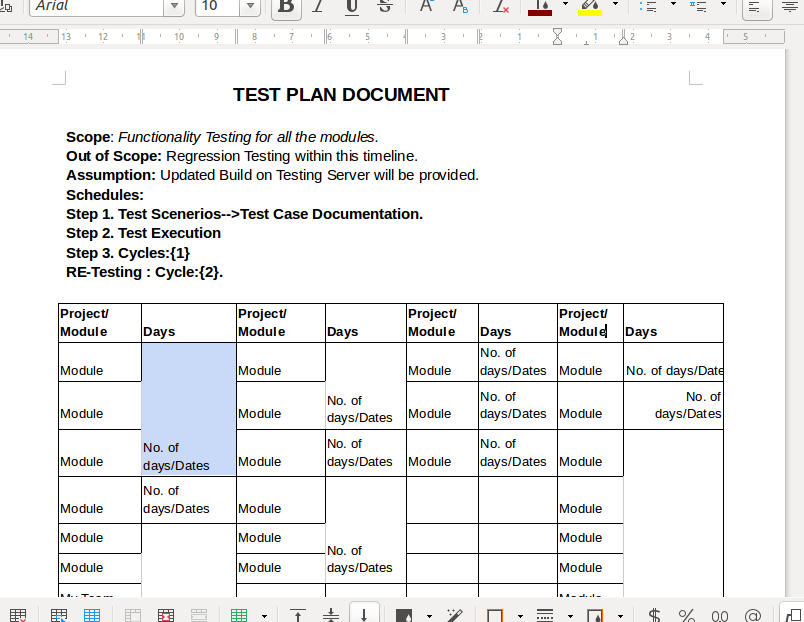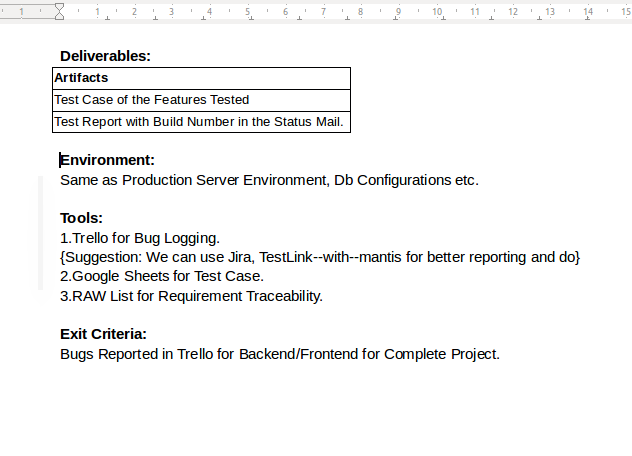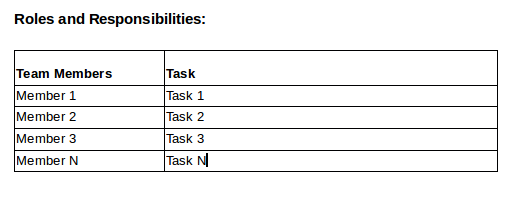Attributes a Test Plan Should Have
Posted By : Neha Dahiya | 24-Jan-2018
A Test Plan document is basically the guide book for the process of testing. Test plan acts as a blueprint for successful execution of the Testing Process, including all of its activities. A detailed test plan includes Test Strategy, Testing Objectives, Resources, Test Schedule, Test Estimation, Test Deliverables
Introduction
A Test Plan Document starts with the project’s introduction and the product which is to be tested. Introduction phase includes the following details:
Project’s Background: Projects’s brief overview and its background is explained.
Purpose: For a given project test plan document provides detail on how testing process will be conducted.
Objectives and Tasks: Objectives and tasks for testing are defined here.
Scope: In this section of test plan document, the scope of testing is identified at high level. Some features are mentioned explicitly which are out of scope.
Test Items: This contains the list of items including their release version and details of the targeted modules for testing.
References: This section contains the documents present and which all can be referenced during the process of testing.

Features to be tested:
Features and functions that is to tested are listed down in detail in this section of the test plan document.All these functions and features which were already defined in the introduction section should fall under the scope of testing.
References of the requirements with requirement ID should be defined for each feature to be tested so that it can be referred by the QA Team. If required any kind of detail or consideration about the feature, should be described. There can also such such features not under the clear scope so cannot be tested due to some reason.Such features should also be documented in the Test Plan Document under the section “Features not to be tested” with the reason why can’t the be tested.
Item Pass/Fail Criteria:
In this section success, criteria of the your tests in the Test Plan Document is defined. While executing test cases there can be following situations. Let’s have a look at these pass/fail criteria for an item.
Suspension Criteria: A situation which can block the ability to continue test or effect in performance testing lead to suspension criteria.
Resumption Criteria: After resolving the problem which caused suspension is resolved, testing activities can be started again.
Approval Criteria: If a item meets the expected outcome defined in a particular test case, it is considered as “Pass”
Approach:
Approach is the most important attribute for a TEst Plan Document. Hence it is the backbone of the Test Process. It clearly indicates what all testings will be applied in the test process. In a testing approach more than one testing technique can be combined such as functional testing, component testing, regression testing, user interface testing, penetration testing etc.Testing Approach also includes tools and required human resources to perform the testing process.It should be described in a way that major tasks could be identified. “Features to be section” should be taken into consideration to adequately define the approach of testing.
Test Deliverables:
After completing every test activity, at the end there is a deliverable associated with it. List of testing deliverables should be included in the test plan document. Following can be included in the Test Deliverables
Test Cases
Issue Report
Performance Report

Roles and Responsibilities:
A test plan document includes the detail of roles and responsibilities of all the individuals in a team.
If the team is big enough, roles and responsibilities can be in a form of the table.
Find a sample test document plan with the “Roles and Responsibilities” section.

Risks and Contingencies:
Identifying risks is a very important activity which is to be planned in a Test Plan Document. Risk is basically a uncertain future event which may occur or may not occur and is correspondingly potential for loss.
Schedule Risk:
For a successful completion of a project, planned deadlines should be met hence they play a vital role.Before preparing mitigation strategy, the reasons for increased likelihood of risk occurrence should be understood.
Lagging behind the schedule can be due to some of the reasons as follows:
Inaccurate time and effort estimation
Unexpected expansion of scope
Inability to foresee the total scope
Inability to complete tasks at the estimated time
Budget Risks:
Budget is one of the crucial element of a project. It may affect the relation with the client and and may affect the success of any project.Any risks associated with the project should should be controlled and mitigated so that any mishappening may not affect your reputation. If the budget is accurate you can manage both, the project and the stakeholders very well.
Few budget risks are listed below:
Wrong Estimation
Resource Budget over run
Cost overrun due to scope
Indirect cost
Operational Risks:
Operational Risks are associated with daily based activities of the project. These risks may lead to failure of the systems or improper process of implementation.QA Team is responsible for overall improvement of the development process. Following risks are included in Operational Risks:
Failure to address priority conflicts
Insufficient resources
No proper subject training
No resource planning
No team communication
Importance of Test Plan:
A test plan document has the following benefits
Test plan Document helps the test team to understand the minute details of testing.
Testing effort estimation can be determined with the help of the Test Plan Document
Test Plan acts as a guide or a rule book, which is followed for better performance.
Test Plan can also be re-used for other projects for important aspects such as Test Scope, Test strategy,Test Estimation etc
Thanks!
Cookies are important to the proper functioning of a site. To improve your experience, we use cookies to remember log-in details and provide secure log-in, collect statistics to optimize site functionality, and deliver content tailored to your interests. Click Agree and Proceed to accept cookies and go directly to the site or click on View Cookie Settings to see detailed descriptions of the types of cookies and choose whether to accept certain cookies while on the site.










About Author
Neha Dahiya
Neha is a bright QA Engineer with skills in manual testing . Apart from finding bugs in application, she loves sketching and painting.